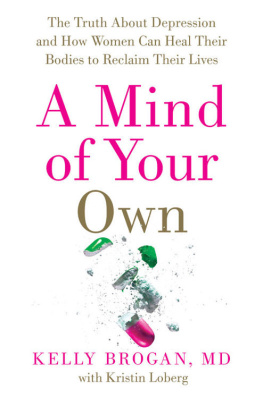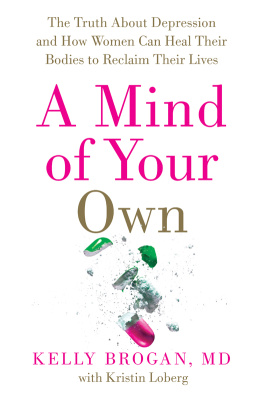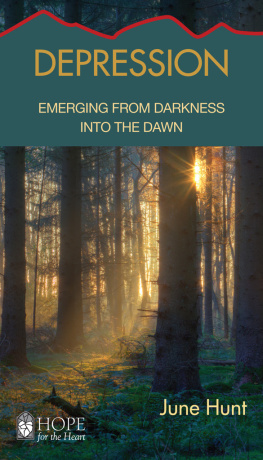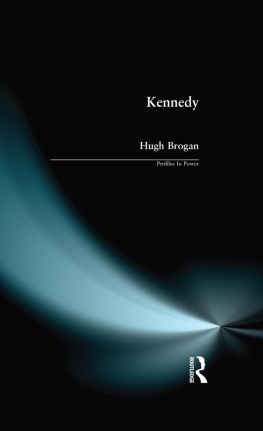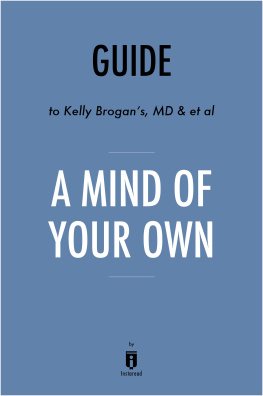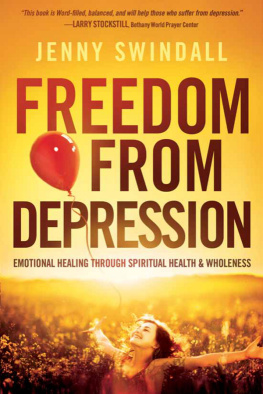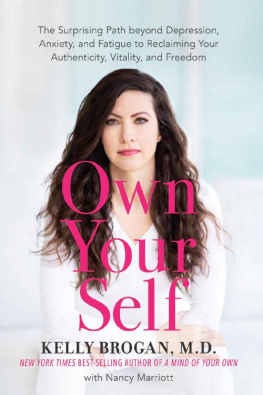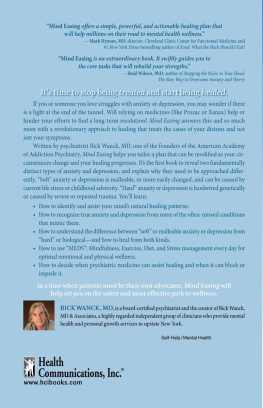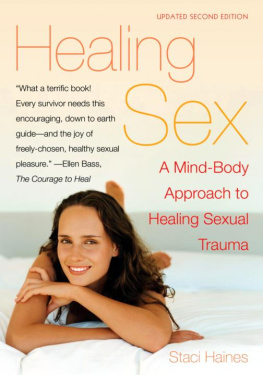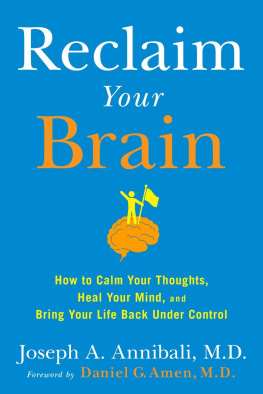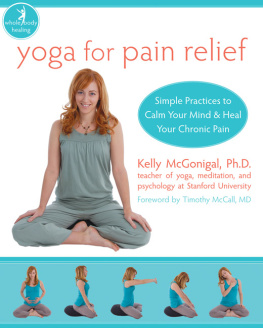
To the legacy of Dr. Nicholas Gonzalez
and to all of the light workers
who illuminate the path for my daughters,
and everyones daughters.
Contents
All along the history of medicine, the really great physicians were peculiarly free from the bondage of drugs.
SIR WILLIAM OSLER (18491919)
I f youve picked up this book, then chances are you can relate to any of the following: persistent distress, malaise, anxiety, inner agitation, fatigue, low libido, poor memory, irritability, insomnia, sense of hopelessness, and feeling overwhelmed and trapped but emotionally flat. You might wake up most mornings unmotivated and uninspired, and you drag yourself around all day waiting for it to end (or waiting for a drink). Maybe you feel a sense of dread or panic without knowing why. You cant silence the negative thoughts, which puts you on edge. Sometimes it seems like you could let loose an endless stream of tears, or perhaps you cant remember the last time you cared enough about something to cry. All of these descriptions are symptoms that typically fall under a diagnosis of clinical depression. And if you were to seek help through conventional medicine, even if you dont consider yourself depressed, youd likely be handed a prescription for an antidepressant, joining the more than 30 million users in America. You might already be part of this community and feel like your fate is now sealed.
It doesnt have to be.
Over the past twenty-five years, ever since the FDA approval of Prozac-type medications, weve been taught that drugs can improve the symptoms of or even cure mental illness, particularly depression and anxiety disorders. Today they are among the most prescribed, best-selling drugs. This has led to one of the most silent and underestimated tragedies in the history of modern health care.
I am a practicing psychiatrist with a degree in cognitive neuroscience from MIT, an MD from Weill Cornell Medical College, and clinical training from NYU School of Medicine, and I care deeply for women struggling with their well-being. Im compelled to share what Ive learned from witnessing the corruption of modern psychiatry and its sordid history while investigating holistic methods that focus on nutrition, meditation, and physical activitywhat some practitioners are calling lifestyle medicine because the approach involves changes in everyday lifestyle habits, not the use of pharmaceuticals. While such drug-free methods are entirely evidence-based, they are virtually unknown in this age of the quick fix.
Lets get a few facts straight from the get-go. Im not a conspiracy theorist. Im not even that politically minded, but I do like to think for myself. Im a natural skeptic and pragmatist. These days, there are a couple of issues in my line of work that are making my blood boil, and Im working to connect the dots between them to help establish a framework for a truth in science sniff-test. For one, symptoms of mental illness are not entirely a psychological problem, nor are they purely a neurochemical issue (and, as well see shortly, not a single study has proven that depression is caused by a chemical imbalance in the brain). Depression is merely a symptom, a sign that something is off balance or ill in the body that needs to be remedied.
And two, depression is a grossly misdiagnosed and mistreated condition today, especially among womenone in seven of whom is being medicated. (For reasons well be exploring, women experience more than twice the rate of depression as men, regardless of race or ethnic background. One in four women in their forties and fifties use psychiatric drugs.) Although I was trained to think that antidepressants are to the depressed (and to the anxious, panicked, OCD, IBS, PTSD, bulimic, anorexic, and so on) what eyeglasses are to the poor-sighted, I no longer buy into this bill of goods. And after reading this book, you too may think twice about all you thought you understood about the causes of depression.
We owe most of our mental illnessesincluding their kissing cousins such as chronic worry, fogginess, and crankinessto lifestyle factors and undiagnosed physiological conditions that develop in places far from the brain, such as the gut and thyroid. Thats right: you might owe your gloominess and unremitting unease to an imbalance that is only indirectly related to your brains internal chemistry. Indeed, what you eat for breakfast (think whole wheat toast, fresh OJ, milk, and multigrain cereal) and how you deal with that high cholesterol and afternoon headache (think Lipitor and Advil) could have everything to do with the causes and symptoms of your depression. And if you think a chemical pill can save, cure, or correct you, youre dead wrong. That is about as misguided as taking aspirin for a nail stuck in your foot.
While its well documented that multiple forcessuch as a tragic life event or the fallout from hormonal shiftscan trigger symptoms labeled (and treated) as depression, no one has explained the potential for antidepressants to irreversibly disable the bodys natural healing mechanisms. Despite what youve been led to believe, antidepressants have repeatedly been shown in long-term scientific studies to worsen the course of mental illnessto say nothing of the risks of liver damage, abnormal bleeding, weight gain, sexual dysfunction, and reduced cognitive function that they entail. The dirtiest little secret of all is the fact that antidepressants are among the most difficult drugs to taper from, more so than alcohol and opiates. While you might call it going through withdrawal, we medical professionals have been instructed by Big Pharma to call it discontinuation syndrome, which is characterized by fiercely debilitating physical and psychological reactions.
So unlike most psychiatrists, Im not one to diagnose a permanent condition, write a prescription, and send my patient on her merry waythe knee-jerk gold standard in my field today. Nor do I have her sit on a couch and talk about her problems endlessly. Much to the contrary, my first item of business is to discuss her medical and personal history, including questions that give me a sense of her lifes exposures since birth, from noxious chemical encounters to whether or not she was born through the birth canal and breast-fed. I also order lab tests that help me take in the bigger picture of her total biology; these are noninvasive screenings that most psychiatrists and general practitioners dont even think about doing (and in this book youll be learning about these easy-to-obtain tests as tools to help you personalize your path to healing).
While I acknowledge my patients past experiences, I also focus on whats unfolding today from a cellular standpoint and the potential impairment (dysregulation) of her immune system. The medical literature has emphasized the role of inflammation in mental illness for more than twenty years. I listen closely and ask her about her current lifestyle, a dismissed and neglected variable in conventional medicine. I reflect on her entirety, considering factors like how much sugar she consumes and other dietary habits, how well her gut and its microbial communities are collaborating, hormone levels such as thyroid and cortisol, genetic variants in her DNA that can put her at a higher risk for symptoms of depression, her beliefs about health, and her intentions for our work together. (And, yes, this takes hours.)
All of my patients share similar goals: they want to feel physically vibrant and emotionally balanced, which I believe is everyones birthrightnot perpetually drained, unsettled, mentally foggy, and unable to enjoy life. Under my guidance, they achieve these goals through very simple and straightforward strategies: dietary modifications (more healthy fats and less sugar, dairy, and gluten); natural supplements like B vitamins and probiotics that dont require a prescription and can even be delivered through certain foods; minimizing exposures to biology-disrupting toxicantslike fluoride in tap water and fragrances in cosmetics; harnessing the power of sufficient sleep and physical movement; and practicing behavioral techniques aimed at promoting the relaxation response. These basic lifestyle interventions facilitate the bodys powerful self-healing mechanisms, and theres plenty of science to support these protocols. This isnt New Age medicine; I will prove my claims and back my recommendations with current peer-reviewed studies from the worlds most esteemed publications.
Next page
